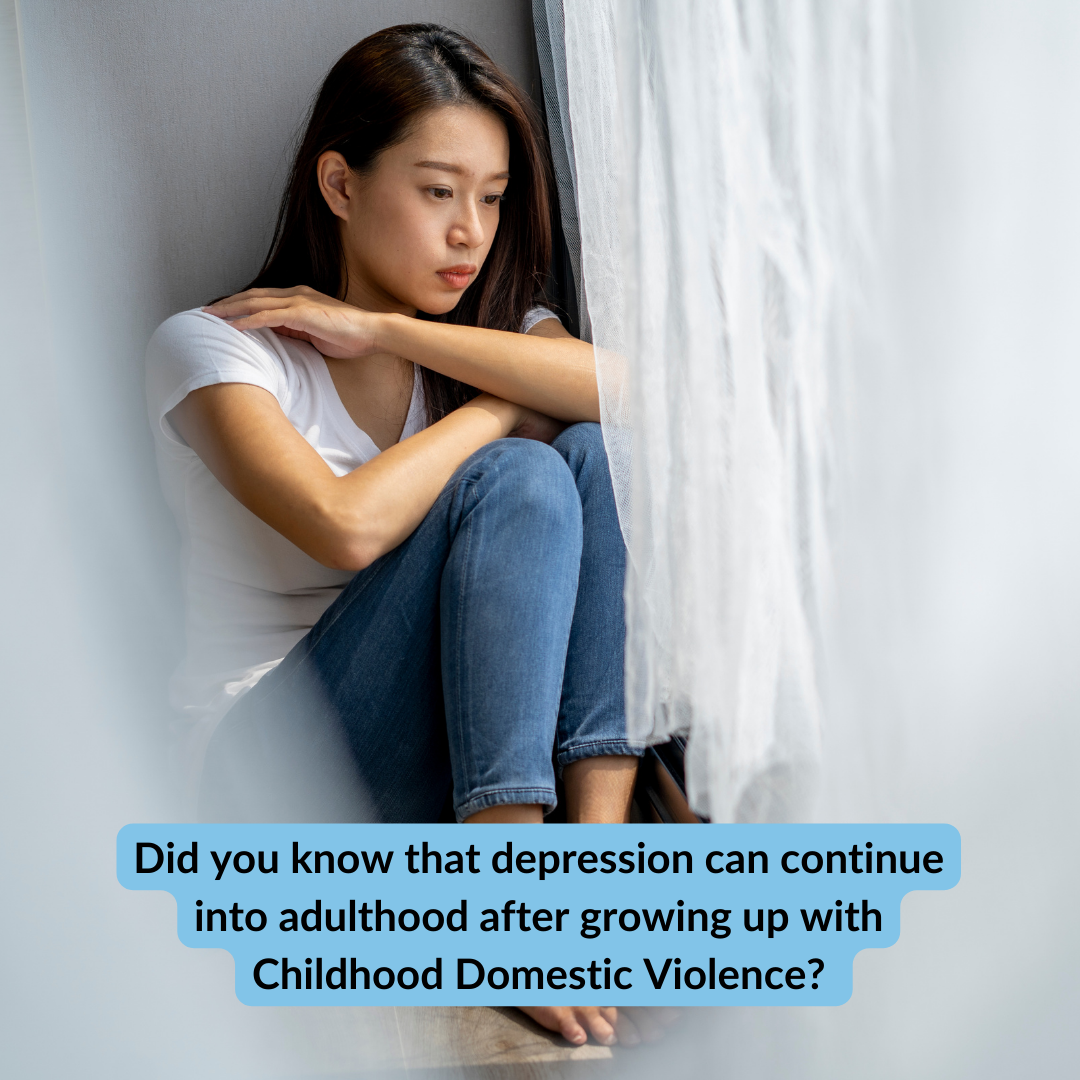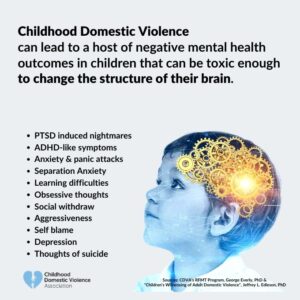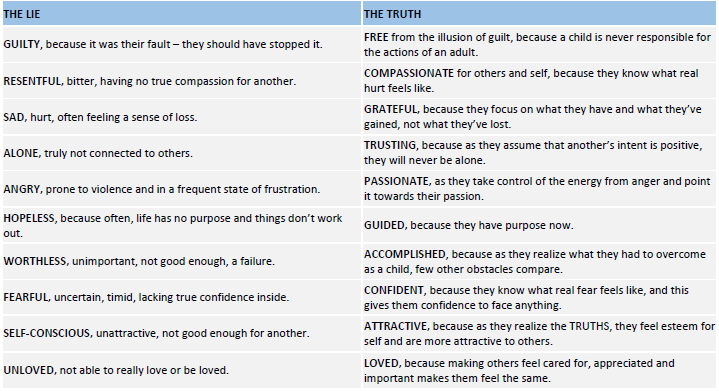
Did you Know that Depression can Continue into Adulthood after Growing up with Childhood Domestic Violence?
You may feel that something has been amiss in your life for some time, or that a lingering sense of sadness persists. Maybe you’ve lost interest in certain things, even things you used to enjoy. The thought of depression slips into your mind but leaves it. You may also wonder if the pain from your childhood home, scarred by domestic violence, has a part to play in how you feel.
Adults are often too busy or responsible to work on their feelings, or think they need to push them aside or ignore them. They can also believe there is no problem – perhaps this is just how life is. Depression is something others face due to chemical or biological factors, but childhood environment couldn’t be a factor, could it?
Brain Awareness Week: Connecting CDV to Depression
For this year’s Brain Awareness Week, the focus is on depression, as it relates to the major adversity of Childhood Domestic Violence (CDV). Understanding the connection between the disorder and this major adversity can enable many adults who grew up with domestic violence to discover truths about their feelings.
They can learn that their experience of CDV can cause depression later in life. The healing process starts with some questions. These questions can help create a new path to understanding how to heal from depression by addressing the root cause of childhood trauma.
Take the First Step
Question 1: Did You Grow up Living with Domestic Violence?
CDV is the least known of the major childhood adversities. It is when you grow up living in a home with domestic violence, and it is seen through the lens of childhood. The violence is not directed at the child but between the adults in the home. Research has shown that CDV has as significant an impact on a child’s future well-being as being the target of violence and abuse.
The impact can linger beyond childhood. Moving away from that toxic and abusive environment does not undo the damage inflicted on the mind and body. Adults who grew up with CDV think about their childhood often and still need to validate their experience. To move forward to healing, knowing what CDV is and understanding that it is still impacting you may help you tackle issues that may be weighing you down, including depression.
Question 2: What is Depression?
Maybe you don’t know if you are dealing with depression as a byproduct of CDV. You may be able to determine it yourself, or you may want to seek professional advice on managing your daily feelings. However, first defining them and examining your symptoms may provide direction on what to do next.
It is shown that a child who grew up in an abusive home environment is more likely to face depression as an adult. Living through domestic violence causes depression, sadness, concentration issues, and more in children that do not stop as they become adults.
Depression is a mood disorder causing feelings of sadness and loss of interest. It is also called major depressive disorder and affects feelings, thinking, and behavior, causing emotional and physical issues. In the worst case, depression can also cause thoughts of suicide and lead one to question the value of life.
Symptoms of Depression
Look at these symptoms of depression, provided by the Mayo Clinic:
- Feelings of sadness, tearfulness, emptiness, or hopelessness
- Angry outbursts, irritability, or frustration, even over small matters
- Loss of interest or pleasure in most or all normal activities, such as sex, hobbies, or sports
- Sleep disturbances, including insomnia or sleeping too much
- Tiredness and lack of energy, so even small tasks take extra effort
- Reduced appetite and weight loss or increased cravings for food and weight gain
- Anxiety, agitation, or restlessness
- Slowed thinking, speaking, or body movements
- Feelings of worthlessness or guilt, fixating on past failures, or self-blame
- Trouble thinking, concentrating, making decisions, and remembering things
- Unexplained physical problems, such as back pain or headaches
- Frequent or recurrent thoughts of death, suicidal thoughts, suicide attempts, or suicide
Why Depression is Hard to Prevent and Diagnose
Depression in adults is a significant problem and hard to tackle as a society. This is often due to the stigma surrounding the topic, both in the public and private spheres. Adults should simply snap out of it, friends might say, or a person may think they are weak and try to shrug off negative feelings.
It can also be challenging to diagnose, due to the variety of symptoms that differ from one individual to another. Older adults, especially, may not exhibit the more obvious symptoms listed above. They may exhibit more aches and pains, memory issues, or may not feel like being social. These subtle symptoms could still indicate depression and impact daily life.
There is a third issue in managing depression, and that is due to a greater lack of awareness of CDV. Bad enough, adult depression is not always diagnosed, or they brush it off, not attempting to understand it. CDV is a global issue, yet not widely known in the domestic violence field or among adults who grew up with it. More awareness of CDV as a major childhood adversity, and one that impacts adults’ ability to lead happy lives, is a critical piece of knowledge that could also reduce adult depression globally.
Question 3: Is the Experience of CDV Still Fueling Depression in My Adult Life?
Studies show that adults who were exposed to domestic violence are more at risk of depression, anxiety, substance abuse disorders, and a lack of social support than children who were not exposed. 22.5% of those exposed developed a major depressive disorder at some point in their life.
The director of the University of Toronto’s Institute for Life Course and Aging and author of the study says, “Our findings underline the risk of long-term negative outcomes of chronic domestic violence for children, even when the children themselves are not abused.”
If you are still not sure if CDV has anything to do with the depression you may be experiencing, looking at what CDV did to your brain as it was developing over time may give you more insight.
Growing up with CDV Rewires the Brain
What does that mean?
There is a relationship between CDV and its impact on a developing brain.
To understand how CDV impacts a person, it is essential to recognize that the brain is the core of where these impacts originate. CDV will often encode a negative belief system. Growing up with domestic violence can teach people to believe things about themselves and the world that are not true.
Pioneering psychiatrist and researcher Daniel Siegel said many years ago:
“The mind develops as the brain responds to ongoing experience…The pattern of firing of neurons is what gives rise to attention, emotion, and memory.”
| Typically, for children, nurturing elements are what become ingrained in a child’s brain through memory and experience. When a child is living in a home with violence where caregivers cannot support the child’s development, this lack of nurturing is apparent. Instead, their brains are filled with fear, hyper-vigilance, and unresolved emotions. |  |
These results are instead what wires or fuses are used for. This child may also face greater sadness, guilt, shame, and be incapable of building trust to maintain much-needed healthy relationships in life. This outcome can also be called toxic stress, which occurs when a child lives with prolonged adversity, such as CDV. Without the nurturing required to grow with a healthy mind and body, the toxic stress levels disrupt brain architecture. This impacts the entire body and all its systems.
The Truths and Lies of CDV
As mentioned, CDV negatively wires a developing brain – it encodes a series of negative beliefs (LIES) early in life, that if unchecked, can last well into adulthood, with significant repercussions in one or all of the key areas a person’s life: physical health, mental health, behavior, and relationships.
These negative beliefs that come from childhood adversities faced are very different from those faced in adulthood. As a child, you are at a more helpless and vulnerable point in your life – you depend on and believe that those adults you live with are meant to and want to take care of you.
If a child grows up with domestic violence, the physical and emotional need for nurturing may not exist, leading to a false belief system. The truths that exist for children not growing up with CDV do not apply to this child living with it. The lies will continue to shape their adulthood and affect all areas of their life.
However, for every lie, there is a corresponding truth. Take a look at these truths of CDV below:

Depression in Adulthood and CDV do Intertwine
Refer back to the impact of CDV or read about it more now and see how much CDV can negatively impact every part of your mind and body, and affect all areas of life.
The impact stems from the LIES built up in the developing brain of a child. These LIES, if unchallenged, can last into adulthood. If you believed growing up, for example, that you were fearful, or sad, or guilty, the brain will continue to find examples to confirm that belief perpetually. If done often enough, the lies persist into adulthood, becoming perceived as truths.
Now go back to the list of symptoms of depression.
Some words that stand out or how you perceive yourself: you feel hopeless, you are angry, you feel worthless.
What about the guilt that you could not stop the violence in your childhood home? Depression causes fatigue, a lack of concentration, and dwelling on failures of your past – this could stifle confidence.
These negative beliefs can hold one back in life and keep them from reaching their potential. The impact of CDV, the Truths and Lies of CDV, and the byproduct of depression are all connected.
Now that I Understand How Depression and CDV Connect and I am Impacted by Both, what Can I Do?
Understand that CDV, nor depression, are things you just get over because you are grown up.
For many adults who grew up with CDV, your answers may have to go beyond this blog. Depression can manifest in many areas beyond childhood adversity. It could be chemical or biological, and it may require professional help. Mental health counselors, therapy, or group therapy are options.
However, for many who have only just discovered what CDV is and that they may be facing depression, consider spending a little time to work through the Worksheets below, created by the Childhood Domestic Violence Association’s founder. He lived through a childhood filled with multiple childhood adversities and is mission-driven to make CDV universally known.
The Worksheets could be the simplest and most effective start to get on a path to self-healing. They are not a means of therapy, and may not work for everyone, but by assessing yourself with honesty, you will start to connect the dots between your life of CDV and your struggle with depression.
It can be the first step in shedding light on negative brain patterns that developed from CDV. It is never too late to unlearn these brain patterns, even as an adult. And it is never too late to change your quality of life and decrease your depressive symptoms. It all starts with some questions.
